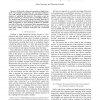Free Online Productivity Tools
i2Speak
i2Symbol
i2OCR
iTex2Img
iWeb2Print
iWeb2Shot
i2Type
iPdf2Split
iPdf2Merge
i2Bopomofo
i2Arabic
i2Style
i2Image
i2PDF
iLatex2Rtf
Sci2ools
107
click to vote
IROS
2007
IEEE
2007
IEEE
Probabilistic inference for structured planning in robotics
Abstract— Real-world robotic environments are highly structured. The scalability of planning and reasoning methods to cope with complex problems in such environments crucially depends on exploiting this structure. We propose a new approach to planning in robotics based on probabilistic inference. The method uses structured Dynamic Bayesian Networks to represent the scenario and efficient inference techniques (loopy belief propagation) to solve planning problems. In principle, any kind of factored or hierarchical state representations can be accounted for. We demonstrate the approach on reaching tasks under collision avoidance constraints with a humanoid upper body.
Dynamic Bayesian Networks | Efficient Inference Techniques | IROS 2007 | Real-world Robotic Environments | Robotics |
Related Content
| Added | 03 Jun 2010 |
| Updated | 03 Jun 2010 |
| Type | Conference |
| Year | 2007 |
| Where | IROS |
| Authors | Marc Toussaint, Christian Goerick |
Comments (0)

